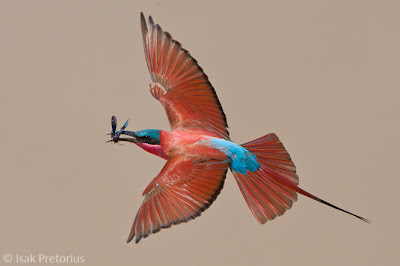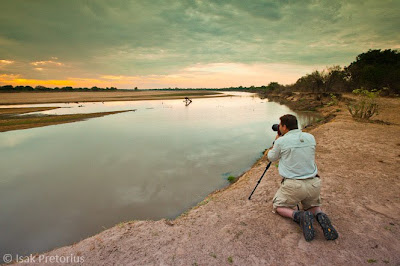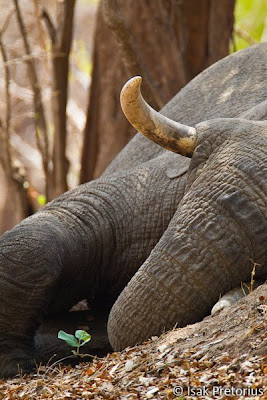The Puku is an antelope found in wet grasslands in southern Democratic Republic of Congo and in Zambia. It stands about 80cm tall at the shoulders and weigh between 70 to 80kg. Puku are sandy brown in colour with the underbelly a few shades lighter. Males have around 50cm long ridge structured horns. Both territorial and alarm calls are a repeated shrill whistle sound. They are beautiful animals! The recent C4 Images and Safaris Workshop took our guests to Puku Ridge Camp in the South Luangwa National Park in Zambia. There are a lot of puku in the park, but we didn't specifically go there to photograph them! Our objective was to find plenty of game and other photographic opportunities. Not only did we find exactly what we were looking for, but we were also blown away by the incredible beauty and variety that the park had to offer!

The South Luangwa National Park is a photographer's dream - wild and remote it's one of Africa's most unspoiled places with enormous spaces, a wide variety of habitats and a high density of game. It is one of Zambia's largest National Parks, covering an area of over 9,000 square kilometers in the Luangwa Valley. The survival of the valley depends on the winding Luangwa River, crowded with hippos, crocodiles and waterfowl, and its numerous tributaries that course through the park. Just before the big summer rains the bushes have wilted and the earth becomes bone dry, so animals assemble along the river and at the remaining waterholes. This is the best time for game viewing.

The Photographic Workshop was held at Puku Ridge Camp, located in a remote area of the National Park overlooking a floodplain close to the Luangwa River. To reach this camp requires a two-hour flight from Johannesburg to Lusaka and then a chartered transfer to Mfuwe Aiport. It's a small intimate camp with seven luxury tents and a communal area with a lounge, bar, dining area and deck, all overlooking a waterhole on the floodplain. As at all Sanctuary Lodges, the food and service are exceptional and we were especially impressed by the quality of the guides. At the waterhole in front of camp there is a constant flow of animals coming to drink during the day, making it an attractive option to skip the afternoon drive to photograph at the waterhole instead, and this from the comfort of the lounge. When we saw a leopard drinking at this waterhole during dinner on our first night, we knew this workshop was going to be special.

As a photographic workshop our guests were not just keen to visit one of Africa's world-renowned wildlife havens, but also keen to learn all the genres and techniques of nature photography. Our workshops always attract people that have an appreciation for nature and a passion for photography, which by default guarantees the workshop to be a great success. We had great fun teaching everything from light and composition, portrait, action, landscape, slow-shutter panning blur, flash, spotlight-at-night, and HDR photography, to processing photos and managing a large photo library. The theory is put into practice during the morning and afternoon game drives where the photography guides are close by to lend a helping hand.
We were spoiled with excellent sightings of predators and general game, birds and spectacular landscapes. Highlights included three leopards trying to break through the tough skin of a dead young hippo. The cause of death was unsure, but the leopards struggled for hours to get to the meat without success and became very agitated with the whole situation. Later that night we returned to see how four lions eventually chased the leopards off the carcass. Other highlights included photographing at a carmine bee-eater colony, ebony forests, mating lions, elephants walking through the river, pools with hundreds of hippos, and spectacular sunsets and sunrises on the Luangwa River.
A big thank you to camp managers Don and Suku, our guides Joseph and Malemia, and the staff of Puku Ridge Camp who made this such an awesome experience for us all!
South Luangwa Photo Workshops September 2011
South Luangwa Photo Workshop October 2011





No comments:
Post a Comment